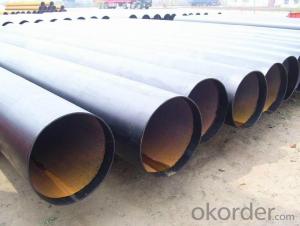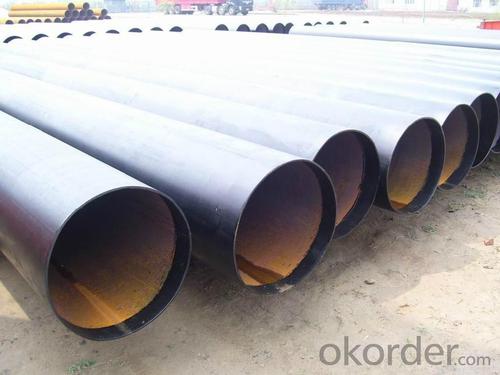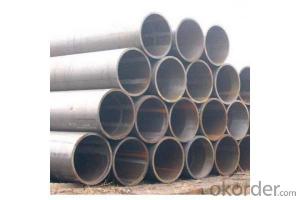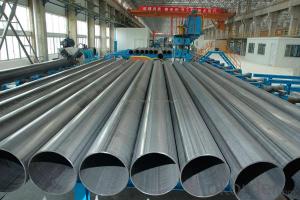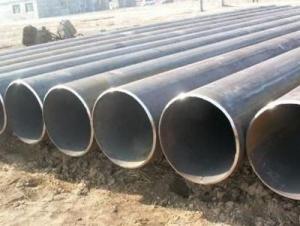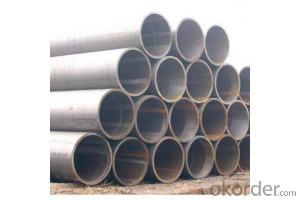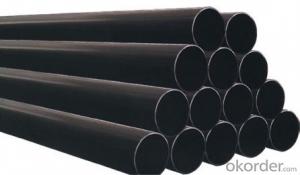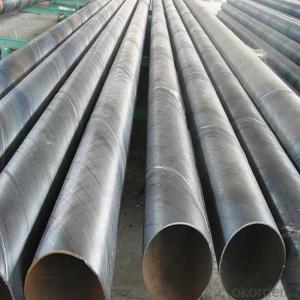LSAW SSAW CARBON STEEL PIPE ASTM API PSL1 PSL2 PIPE LINE 20''
- Loading Port:
- Tianjin
- Payment Terms:
- TT OR LC
- Min Order Qty:
- 1 m.t.
- Supply Capability:
- 3000 m.t./month
OKorder Service Pledge
OKorder Financial Service
You Might Also Like
Packaging & Delivery
Packaging Detail: | Normal exporting packing,in container or bulk vessel or as per clients' request |
Delivery Detail: | 2 months after confimed contract |
Specifications
Large Diameter API 5L X70 PSL2 LSAW Steel Pipe
Grade: X42, X46, X50, X52, X60, B, C
OD: 1.5"-28"
WT: SCH10-SCH160
Large Diameter API 5L X70 PSL2 LSAW Steel Pipe
Specifications:
u Standard: API 5L
u Grade: B, C, X42, X46, X50, X52, X56, X60, X65, X70, X80
u OD: 1.5"-28"
u WT: SCH10-SCH160
u Length: 5-12m
u Ends Finish: plain end, bevel end, grooved end
u Surface Treatment: bare, black varnished, oiled finish, red color, anti-corrosion, 3PE, FBE or epoxy coating
u Technique: hot rolled or cold drawn
u Application: api 5l steel pipe for conveying oil, water, gas
u Invoicing: based on theoretical weight or actual weight
u Payment Terms: L/C at sight, T/T or Western Union
u Trade Terms: FOB, CFR, CIF
u Certification: ABS manufacturing assessment, ABS design assessment, API 5CT, API 5L, DNV manufacturer certificate, ISO9001 quality management system certificate, ISO14001 environment management system certificate, GB/T28001 occupational health and safety management system certificate, A1 class manufacturing license of special equipment certificate, CCS, GL, LR, SGS, TüV, PDE
- Q: Can steel pipes be used for underground cable conduits?
- Yes, steel pipes can be used for underground cable conduits.
- Q: Are steel pipes suitable for semiconductor manufacturing plants?
- Yes, steel pipes are suitable for semiconductor manufacturing plants. Steel pipes offer several advantages such as high strength, durability, and resistance to corrosion, making them ideal for transporting various fluids and gases used in semiconductor manufacturing processes. Additionally, steel pipes can withstand high pressure and extreme temperatures, ensuring the safe and efficient operation of semiconductor manufacturing plants.
- Q: What is the maximum allowable stress for steel pipes?
- The maximum allowable stress for steel pipes depends on various factors such as the grade of steel, diameter, wall thickness, and the intended application. It is typically determined by industry standards and codes, such as the American Society of Mechanical Engineers (ASME) Boiler and Pressure Vessel Code. Therefore, there is no one-size-fits-all answer to this question.
- Q: How do you calculate the deflection of a steel pipe?
- To determine the deflection of a steel pipe, one must take into account various factors, including material properties, applied loads, and geometrical characteristics. The following steps can serve as a guide: 1. Material properties must be determined. This involves obtaining information about the steel pipe, such as its Young's modulus (E), which signifies its stiffness or resistance to deformation. Typically, this value is provided by the manufacturer or can be found in material databases. 2. The applied loads need to be analyzed. It is necessary to identify the types and magnitudes of the loads acting on the steel pipe. These loads can consist of point loads, distributed loads, or a combination of both. Additionally, the location and orientation of the applied loads must be determined. 3. The geometry of the pipe must be evaluated. The dimensions of the steel pipe, including its length (L), outer diameter (D), and wall thickness (t), should be measured or obtained. Accuracy in these values is crucial for precise calculations. 4. An appropriate calculation method should be selected. Depending on the complexity of the loading and support conditions, one may need to employ either simple beam theory or more advanced structural analysis methods, such as the finite element method (FEM). 5. The relevant equations must be applied. For simple beam theory, the Euler-Bernoulli beam equation can be utilized to calculate the deflection at a specific point on the pipe. This equation assumes the pipe is homogeneous, linearly elastic, and subjected to small deflections. In more complex scenarios, FEM software can handle the calculations. 6. Boundary conditions must be determined. The support conditions at both ends of the pipe, which can include fixed supports, simply supported ends, or combinations of both, need to be identified. These conditions significantly influence the deflection of the pipe. 7. The deflection can be calculated. By using the equations relevant to the chosen method and incorporating the material properties, applied loads, and geometry, one can calculate the deflection at specific points along the steel pipe. The deflection can be measured in terms of vertical displacement or angular rotation. It is important to note that calculating the deflection of a steel pipe may require specialized engineering knowledge and software tools. If one lacks experience in structural analysis, it is advisable to consult a professional engineer to ensure accurate results and safe design.
- Q: What are the different standards for steel pipe manufacturing?
- There are several standards for steel pipe manufacturing, including ASTM (American Society for Testing and Materials), API (American Petroleum Institute), DIN (Deutsches Institut für Normung), and JIS (Japanese Industrial Standards). These standards define the specifications for various aspects of steel pipe production, such as dimensions, material composition, mechanical properties, and testing procedures. Compliance with these standards ensures the quality and reliability of steel pipes for different applications, ranging from construction and infrastructure to oil and gas industries.
- Q: What are the different types of joints used in steel pipes?
- The different types of joints used in steel pipes include butt weld, socket weld, threaded, and flanged joints.
- Q: What do you mean by "SC" in welded pipe SC200? What's the diameter of 200?
- 200 refers to the diameter of the pipe. Personally, you should be an electrical professional, but the electrical specialty rarely uses the 200 pipe diameter unless it is used when the buried cable passes the road;
- Q: How are steel pipes marked for identification?
- Steel pipes are marked for identification through a process called pipe marking. This involves applying labels or markers on the surface of the pipes to provide relevant information about their specifications and characteristics. The markings typically include details such as the pipe's size, grade, material composition, manufacturer's logo or name, and any other relevant codes or standards. These markings are crucial for identification and help ensure that the correct pipes are used for specific applications, as well as for maintenance and repair purposes. Additionally, the markings also aid in quality control and traceability, enabling easy identification and tracking of pipes throughout their lifecycle. Overall, proper identification of steel pipes through clear and durable marking systems is essential for maintaining safety, efficiency, and compliance in various industries where these pipes are utilized.
- Q: What is the role of steel pipes in the transportation of chemicals?
- The role of steel pipes in the transportation of chemicals is to provide a safe and reliable means of transporting various types of chemicals over long distances. Steel pipes are highly resistant to corrosion, which is crucial when dealing with corrosive chemicals. They are also strong and durable, ensuring that the pipes can withstand the pressure and weight of the chemicals being transported. Additionally, steel pipes are able to maintain the integrity of the chemicals, preventing any leakage or contamination during transportation. Overall, steel pipes play a vital role in ensuring the efficient and secure transportation of chemicals.
- Q: How are steel pipes protected against rust?
- Steel pipes can be safeguarded against rust in various ways. One popular approach entails applying a protective coating to the pipes. This can be achieved through the use of a paint layer, epoxy, or a corrosion-resistant coating like zinc or galvanized coatings. These coatings act as a barrier between the steel and moisture, preventing rust formation. Another technique for shielding steel pipes from rust involves cathodic protection. This method employs sacrificial anodes, typically composed of zinc or magnesium, which are affixed to the steel pipes. These anodes corrode instead of the steel, sacrificing themselves and preventing rust on the pipes. In addition to coatings and cathodic protection, corrosion inhibitors can also be employed to protect steel pipes against rust. Corrosion inhibitors are chemicals that are added to the water or fluid flowing through the pipes. These chemicals generate a protective film on the steel's surface, inhibiting corrosion and preventing rust formation. Furthermore, regular maintenance and inspections play a vital role in safeguarding steel pipes against rust. Promptly addressing any signs of damage or wear on the protective coatings is crucial to prevent rust formation. Additionally, ensuring that the pipes are properly cleaned and dried before applying protective coatings can enhance their effectiveness. In summary, a combination of protective coatings, cathodic protection, corrosion inhibitors, and regular maintenance is utilized to effectively shield steel pipes against rust and corrosion. This approach prolongs their lifespan and maintains their structural integrity.
Send your message to us
LSAW SSAW CARBON STEEL PIPE ASTM API PSL1 PSL2 PIPE LINE 20''
- Loading Port:
- Tianjin
- Payment Terms:
- TT OR LC
- Min Order Qty:
- 1 m.t.
- Supply Capability:
- 3000 m.t./month
OKorder Service Pledge
OKorder Financial Service
Similar products
Hot products
Hot Searches
Related keywords
